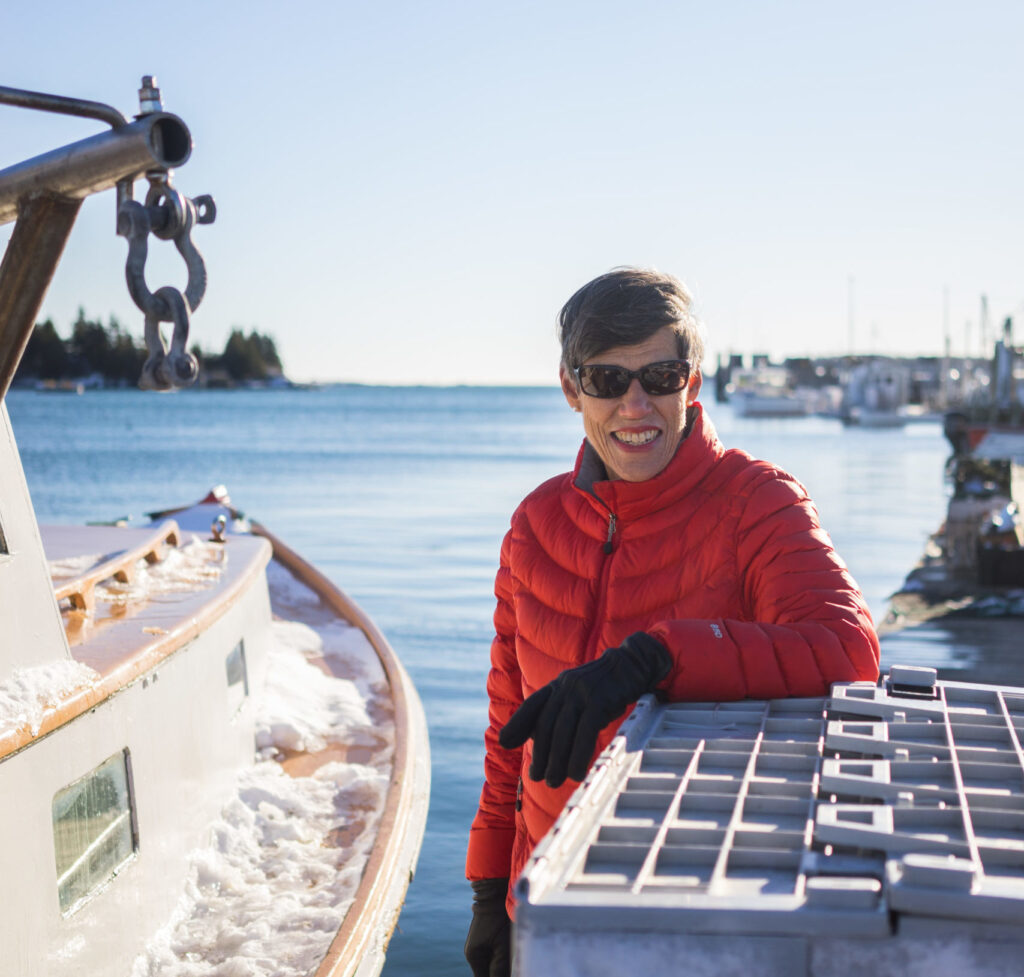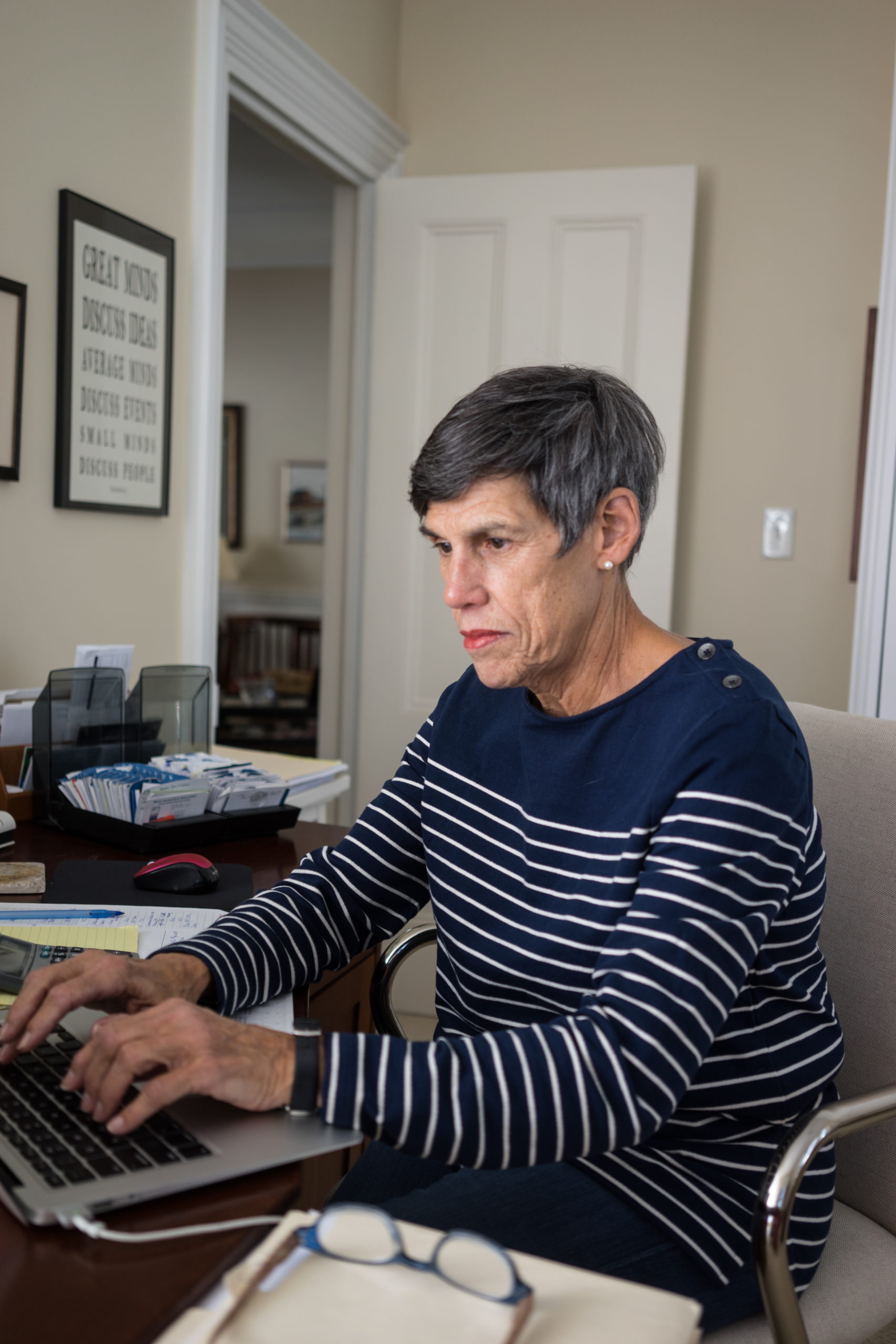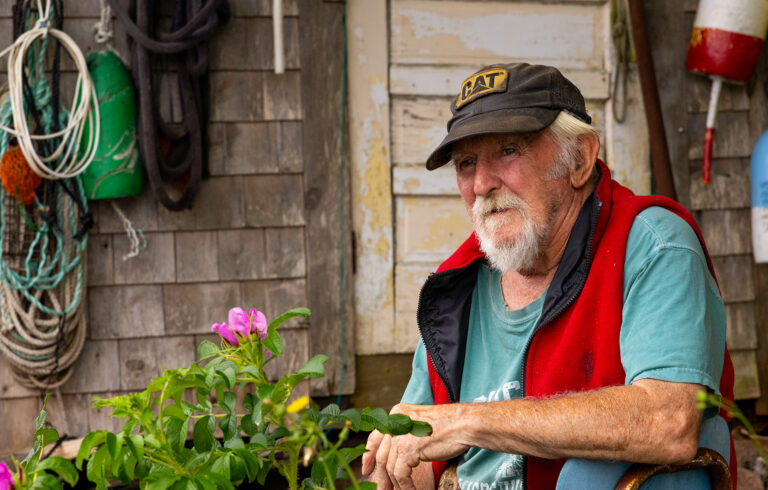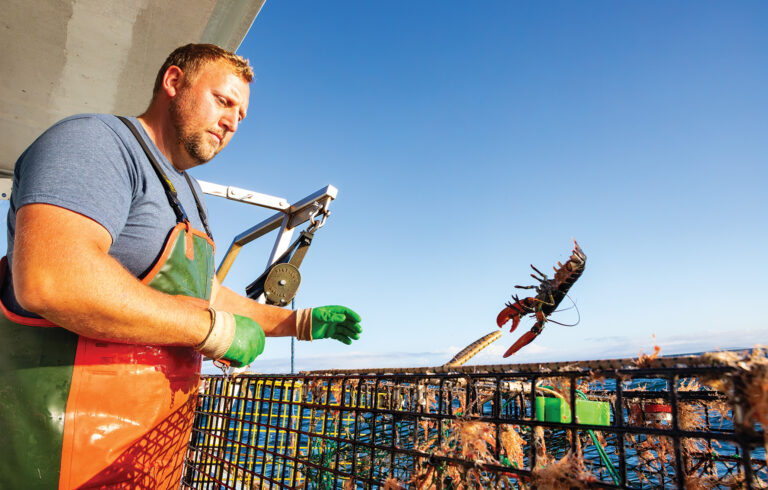
Without the work that connects lobster with customers around the country and world, Maine’s iconic seafood would be a local, seasonal snack. And without that effort, the iconic lobsterman—who in 2016 shared in $533 million in sales—would be a quaint and anachronistic figure, perhaps reduced to part-time work.
Thanks to people like Emily Lane, though, lobster is in steady and ever-growing demand, from California to Korea, from cruise ships to haute cuisine restaurants, in ready-to-microwave ravioli to still-squirming in the crate at a beachfront cookout.
As is the case with many islanders, Lane, 69, willingly accepted the career limitations that living on Vinalhaven presented. Yet she figured out how to thrive–and to do so by supporting a community and industry she loves.
Catch her at work today and you might overhear her talking to a buyer in Italy or Spain, illustrating that a technology as old as long-distance phone service still opens doors and provides islanders with opportunity. But her career as a lobster marketer wasn’t predestined.
Lane grew up in Wellesley, Massachusetts, and earned a degree at the University of New Hampshire in English literature, with minors in history and speech therapy. While she got her start out of state, she did have ties to Maine and to the seafood industry: her mother was born in Woolwich and grew up in Augusta, and her grandfather was the state Department of Agriculture’s chief inspector, ensuring that seafood and produce were safe to consume.
After graduating college in 1970, she began a career in education, teaching first at Mount View High School in western Waldo County and then, just a year later, settling in Vinalhaven to teach remedial subjects at the town’s school.
“I really fell in love with the community,” she remembers, “and over the years, I became very deeply involved.” She fell in love, too, with Tim Lane, whose ties to the island go back generations–his great-great-grandfather had been a sea captain.
She took time off to raise their two sons, but it wasn’t long before locals recognized in Lane what is readily apparent today: she’s smart, focused on doing the work, and unconcerned with getting credit. In short, a leader who could effectively advocate for the fishing community.
“I fell into the fish business. English lit majors had to be creative in what they did,” she jokes. “I probably wouldn’t be doing what I’m doing now, if I lived on the mainland.”
“Fishing constitutes so much of the economy. That’s why I have such a passion for this work.”
— Emily Lane
She was recruited to serve on the board of directors of the island’s now-defunct Pen Bay Fish and Cold Storage business operated out of the town-owned fish plant. By the late 1980s, she had been pressed into service running the company.
In the early 1990s, Claw Island Foods came to the island to lease the fish plant and process lobster. Lane eventually became general manager, overseeing domestic and international sales. The business closed in 2010.
In 2006, board members with the Vinalhaven Fisherman’s Co-op approached Lane about helping manage the operation.

“They were experiencing some serious and challenging financial downturns,” she remembers. With the late Ted Johansen, she collaborated on restructuring loans and securing new financing to get the co-op back on its feet. In 2013, Lane returned after a three-year hiatus on the mainland following the death of her husband.
Since then, Lane has run the organization on a part-time basis, though she can’t speak the “part-time” phrase without a rueful laugh, suggesting she spends a lot more than 20 hours a week on the job.
“Fishing constitutes so much of the economy. That’s why I have such a passion for this work,” she says.
In 2010, she joined Calendar Islands Maine Lobster Company as vice-president of sales. She describes Calendar Islands as a “supply chain partnership between Maine lobstering families, talented chefs, and the best dockside lobster processing operations.” The company offers a number of traditional and value-added lobster applications.
Lane specializes in export sales and has working relationships with buyers in more than 15 countries in Asia and Europe. Her role today as a lobster marketer is not so far removed from her first role as a teacher: education is a big part of her work.
“I try to educate my customers,” she says. “I bring some of my customers to the island for them get a feel for the industry,” a move that invariably leaves buyers impressed with Maine lobsters and the communities they sustain.
“It’s all about developing relationships, and transparency with your customers,” Lane says, explaining how she can be effective in her role as lobster marketer. “I give my buyers the best possible information on the industry.”
She thinks it’s important to educate not just those buying lobsters–her customers–but the fishermen, too. Fishermen, Lane believes, are often too removed from the markets in which their catch lands. She tries to educate them about the links in the chain, and the associated risks. The Vinalhaven Fishermen’s Co-op encouraged some of its members to attend the Boston Seafood Show so they could witness first-hand how marketing dollars are being spent.
Marketing efforts take significant investment. Calendar Islands Maine Lobster devotes a five-figure budget to have a presence at the global seafood expo held in Brussels.
“It’s a very significant show for our company,” she said. Every edge makes a difference in an export landscape impacted by free trade agreements, ever-changing regulations, and fluctuating economics.
Her efforts and the efforts of others who advocate for Maine’s lobster industry are paying off.
“Companies are now using lobster to develop new recipes and are offering innovative, easy-to-prepare, value-added products to both food service and retail sectors,” she explains. And fishermen are now included as spokesmen and stakeholders in those companies.
Lane’s lobster advocacy goes far beyond her job, though. Her passion for the fishing industry and her island community led her into civic involvement.
This spring she will finish the final of four terms serving on Vinalhaven’s board of selectmen. She’s also done stints on the school board and planning board.
Lane also has served on lobster promotion groups, and is currently a member of the Maine Lobster Marketing Collaborative Advisory Board. She has served on the state ferry advisory board, and on a statewide board that oversaw community action agencies.
In 1984, she ran for a seat in the Maine House of Representatives, winning by 10 votes—a margin that reversed to a 10-vote loss in a recount.
And Lane is vice-chairwoman of the board of trustees for the Island Institute, publisher of Island Journal.
She readily admits to having taken unpopular positions at times—something an effective leader typically has on her resumé.
“I have strong opinions and a strong work ethic,” an assertion no one who has seen Lane in action would dispute.




